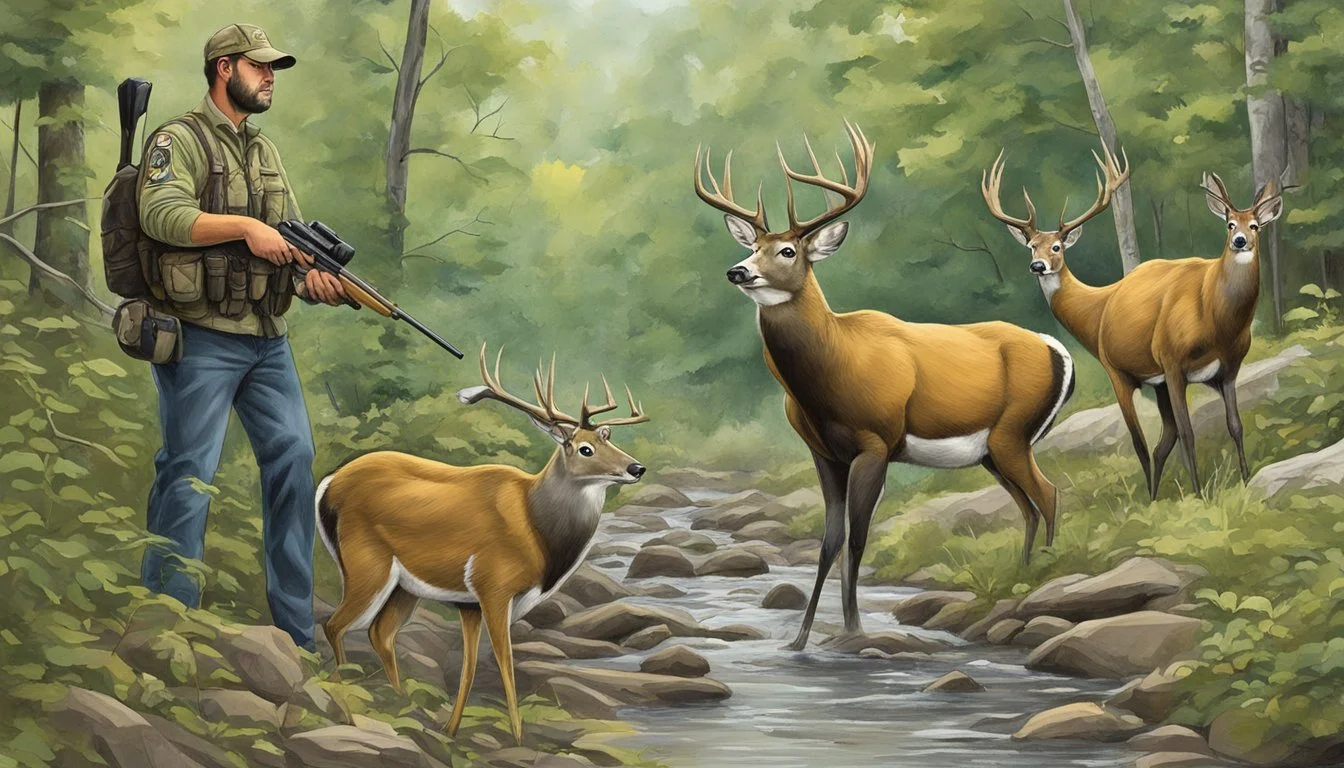Hunting Leases West Virginia
Your Guide to Securing Prime Land
West Virginia has a storied tradition of hunting, offering a wide variety of game in its rich, diverse woodlands. Recognized historically as a prime hunting destination in the Eastern United States, the state has become increasingly attractive for those seeking responsibly managed wildlife and well-preserved habitats. Hunting leases in West Virginia provide hunters with the opportunity to access private lands where they can pursue game such as white-tailed deer, turkey, and a range of small game and furbearers.
Opting for a hunting lease can be beneficial for both landowners and hunters. Landowners can generate revenue from their property, while hunters gain exclusive or semi-exclusive access to private land, which can often lead to higher quality hunting experiences. Leasing also promotes conservation practices, as those who lease their lands are often motivated to engage in wildlife management to ensure a sustainable hunting environment.
The state offers a variety of leasing options, from small parcels suitable for individual hunters to expansive tracts of land that can accommodate larger hunting parties. With leases varying by size, price, and available game species, hunters can find options that fit their specific needs. Professional wildlife management has enhanced the success rates of hunting in West Virginia, reinforcing the state's reputation as a premier destination for hunters from the surrounding urban areas and beyond.
Overview of Hunting Leases in West Virginia
West Virginia, known for its rich natural resources and diverse wildlife, offers numerous opportunities for hunters seeking access to private land. Hunting leases are formal agreements whereby landowners allow hunters to use their property for hunting activities in exchange for payment. These leases promote responsible wildlife management and provide a source of income for landowners.
Hunting Leases by the Numbers:
Acreage: Range from small plots to over 2,000 acres.
Duration: Typically structured annually.
Capacity: Some leases limit the number of hunters.
Wildlife Diversity: Leases cater to various hunting preferences, including whitetail deer, turkey, and black bear among others. The state's habitat supports a robust population of game animals, making it a desirable destination for hunters.
Land Management: Hunting leases contribute to the conservation of wildlife habitats and ensure the ethical use of land resources. They also create an enforceable system of rules that all parties must agree upon, including the number of hunters and permissible activities such as the use of ATVs for hunting purposes.
Hunting Lease Amenities: While some leases offer basic access to land, others may have additional amenities such as camping sites. Hunters must comply with specific lease terms and club rules.
With a mixture of forested terrain and rolling hills, West Virginia's private lands available for lease are often connected to excellent wildlife habitats. Hunters are advised to understand property borders and respect other members' areas when considering a lease. West Virginia's hunting leases are an integral part of the state's outdoor recreation and land stewardship efforts.
Types of Hunting Leases Available
West Virginia offers a diverse range of hunting leases to cater to different hunting preferences. Each type of lease provides unique opportunities and environments for hunters to enjoy.
Big Game Hunting Leases
West Virginia's big game hunting leases are primarily sought after for deer and bear. These leases often span hundreds of acres, providing ample space for hunting. For example, large tracts of land connected to good wildlife habitat increase the chances of encountering big game.
Typical game: Deer, Bear
Lease sizes: 40 acres and up
Small Game & Furbearer Hunting Leases
Small game and furbearer hunting leases allow for hunting species such as rabbit and grouse. The leases usually cover various types of terrain, from open fields to dense forests, enhancing small game hunting opportunities.
Typical game: Rabbit, Grouse
Environment: Varied terrain
Upland Bird Hunting Leases
Upland bird hunting leases are specialized for hunters targeting species like turkey. These leases provide terrain such as woodlands and fields where these birds are commonly found.
Typical game: Turkey
Preferred terrain: Woodlands, fields
Waterfowl Hunting Leases
Lastly, waterfowl hunting leases cater to hunters interested in ducks and geese. These leases are typically near ponds, lakes, or wetlands, providing natural habitats for waterfowl.
Typical waterfowl: Ducks, Geese
Location: Near water bodies
Searching for the Right Lease
When searching for a hunting lease in West Virginia, hunters have diverse resources at their disposal. They can utilize state resources for current listings and leverage specialized online platforms and services that provide comprehensive lease details, including property size, game types, and lease terms.
Using State Resources
The West Virginia Division of Natural Resources (WVDNR) is a primary source for hunters seeking local leasing opportunities. They offer informative materials and guidance on state-managed lands. Hunters can sign up for the Property Alert Newsletter or follow the WVDNR's blog for up-to-date information on available leases. The state's resources are an excellent starting point to understand the regulations, seasons, and types of game specific to West Virginia.
Online Platforms & Services
Hunters can access numerous online platforms that specialize in hunting leases. For example:
HLRBO (Hunting Lease Resource Business Organization) enables search by state, county, and preferred hunting types, including filter options for lease term and acreage.
Hunting Lease Network lists properties with elaborate descriptions, including the lease end date and permissible game on the property.
HuntingLocator.com and Base Camp Leasing provide listings for various game species along with details specific to West Virginia properties.
These services often include user-friendly search functions and may offer additional tools like blog articles with tips on selecting the right lease or signing up for property alert newsletters to keep potential lessees informed about new listings.
Benefits of Leasing Hunting Land in WV
In West Virginia, leasing hunting land allows hunters to secure private areas where game is often more abundant. For hunters, one major benefit is the access to managed lands that are less pressured than public hunting grounds. Here are several advantages for hunters considering leases in West Virginia:
Privacy: on a leased property, hunters usually share the space with fewer people compared to public lands.
Stewardship: it affords the opportunity to invest in the land's health, promoting sustainable wildlife populations.
Additionally, property owners, including absentee landowners and timberland investors, benefit from leasing as well:
Landowner Benefits Description Revenue Generation Landowners earn income from leasing otherwise unused or underutilized land. Land Maintenance The presence of hunters can help maintain the health of the forest. Wildlife Management Leases can include provisions to manage wildlife populations responsibly.
West Virginia hunting leases often come with member benefits that can include:
Exclusive access rights during hunting seasons.
Ability to select and prepare stand locations.
Permission for responsible ATV use for hunting purposes.
Leasing land in West Virginia not only supports individual hunters and hunting groups seeking quality game but also plays a significant role in the state's conservation efforts. By providing a source of income for landowners, it also encourages the preservation of natural habitats and responsible wildlife management.
Pricing and Costs
West Virginia offers various hunting leases that cater to different budgets and requirements. The pricing of hunting leases in West Virginia can range significantly based on factors such as location, size, amenities, and the type of hunting permitted.
For budget-conscious hunters, leases can occasionally be found for under $1,000. These are often smaller acreages or less sought-after locations but can still provide ample hunting opportunities. Hunters can expect basic amenities and should verify the specific inclusions of such leases.
At a mid-range level, prices vary widely. Leases for 89 acres in Wood County for instance, come under this category. The exact cost often depends on the type and quality of the hunting grounds as well as additional facilities provided.
The upper-end leases can climb to over $15,000, often offering extensive acreage that accommodate big game hunting, such as deer and bear. Acreage on these leases can exceed 1,000 acres, including diverse landscapes and sometimes rich amenities like furnished restrooms and security features.
Here is a pricing table for quick reference:
Acreage Price Range Amenities Potential Small Under $1,000 Basic Medium $1,000-$15,000 Moderate to Full-Featured Large $15,000+ Full-Featured
Leases ending on specific dates, such as April 1, 2024, could influence the annual rate, and it's common that all legal game can be pursued within the term of the lease. Hunters are advised to consider the full term of the lease and the types of game allowed when assessing value.
Note: Always confirm the specifics of a hunting lease directly with the landowner or leasing agent, as amenities and restrictions can greatly affect pricing.
Legal Aspects and Regulations
Hunting leases in West Virginia must adhere to both state hunting regulations and specific lease agreements. Understanding these legal frameworks is essential for managing wildlife resources sustainably while respecting the rights of landowners.
State Hunting Regulations
In West Virginia, hunting seasons and regulations are set by the West Virginia Division of Natural Resources (WVDNR). These regulations are designed to conserve wildlife populations and ensure hunter safety. Key points include:
Licenses: Hunters must possess the appropriate licenses to hunt in West Virginia.
Seasons: There are specific dates when hunters are allowed to hunt various game species.
Equipment: Use of all legal firearms and archery equipment is regulated by the state.
Wildlife laws ensure that game species are harvested responsibly. The WVDNR periodically updates these regulations, so it's vital for hunters to stay informed on current rules, which can be found in publications such as the annual hunting and trapping regulations summary.
Lease Agreements
A hunting lease agreement is a legal contract between the landowner (lessor) and the hunter or group of hunters (lessees). These documents specify:
Duration: The time period during which the lease is valid.
Activities Permitted: Types of hunting allowed on the property.
Costs: Fees associated with the lease.
Lease agreements often recommend or require liability insurance, such as those provided by the American Hunting Lease Association (AHLA), to protect both parties in case of accidents or property damage.
It's crucial that all parties involved in a hunting lease in West Virginia clearly understand their rights and responsibilities as outlined in the lease contract, which must be compliant with state regulations.
Landowner Information
Landowners in West Virginia have the opportunity to generate income and effectively manage wildlife populations on their properties through hunting leases. This section provides detailed insights into the benefits and process for landowners interested in such arrangements.
Benefits for Landowners
The primary advantage for landowners leasing hunting rights is the potential for a steady income stream. This is particularly beneficial for absentee landowners who do not reside on the property and want it to remain productive. Additionally, leasing helps in wildlife management, often leading to healthier ecosystems and better game management for species like deer and turkey. Farm owners and timberland investors see value in hunting leases as they encourage responsible use of the land, potentially reducing issues like trespassing and poaching.
How Leasing Works for Landowners
For landowners, the leasing process generally involves several steps:
Assessment of Property: Evaluating the potential of the land for hunting and determining suitable game species.
Setting Terms and Conditions: Establishing clear rules regarding hunting methods, seasons, and the number of hunters allowed.
Marketing the Lease: Utilizing platforms like HLRBO or contacting local hunting networks to advertise the lease.
Finalizing the Lease: Involves agreeing on payment terms with the lessee and signing a contract.
Landowners can contact us for assistance and learn more about us and our services dedicated to facilitating hunting leases in various counties across West Virginia. They can benefit from expert guidance, ensuring that all aspects of the leasing agreement protect their interests while offering a fair deal to the hunters.
Hunter Resources and Responsibilities
In West Virginia, hunters are provided with a plethora of resources to enhance their hunting experience, and they must adhere to strict guidelines and safety protocols. Preparation and knowledge of equipment are key to a successful and ethical hunting trip.
Hunter Guidelines
Hunters must be aware of the maximum number of hunters allowed on a lease to ensure sustainable wildlife management and a quality hunting experience. They should follow all state regulations and lease rules without exception, which typically include no camping restrictions and ATV use solely for hunting purposes.
Max Hunters: Often defined per lease, such as a cap of 4 hunters for a 40-acre lease.
Lease Rules: No camping, specific amenity use, and respect for designated hunting areas.
Safety and Ethical Hunting
Hunters bear the responsibility to engage in practices that prioritize safety and ethics. This includes proper weapon handling, identifying and respecting the game seasons, and following all hunting laws to maintain the integrity of the sport.
Firearm Safety: Always treat firearms as if they are loaded and be mindful of muzzle direction.
Legal Seasons: Abiding by the designated hunting seasons for species like white-tailed deer, turkey, and black bear.
Hunting Gear and Preparation
To ensure they are well-equipped, hunters can take advantage of industry exclusive discounts at hunting shops for their gear and preparation needs. The right equipment, when used correctly, can make a significant difference in the overall experience.
Preparation Checklist:
Clothing: Camouflage and weather-appropriate attire.
Tools: Maps, compass, or GPS device.
Hunting Gear: Firearm/bow, ammunition/arrows, and associated accessories.
Safety: First aid kit, emergency whistle, and fire-starting materials.
By utilizing available resources, such as guides on hunting blogs or advice from seasoned hunters, individuals can enhance their skills and knowledge, leading to a more productive and responsible hunting trip.
Managing Wildlife Populations
In West Virginia, the Wildlife Resources Section takes a structured approach to the conservation and management of wildlife populations across the state. This management is essential for maintaining biodiversity and providing quality hunting experiences. They operate within Wildlife Management Areas (WMAs) by actively sustaining habitats, ensuring sustainable harvest levels, and engaging with public and private stakeholders.
Wildlife Management Areas have become pivotal in conserving wildlife populations. The WMAs are strategically acquired lands that:
Provide habitats for a diverse range of wildlife species
Ensure availability for public hunting
Support wildlife biologists in the conservation of species
Hunting leases, a component of the overall wildlife population management framework, provide controlled access to private lands for hunting. They create a mutually beneficial situation where:
Landowners generate revenue and receive assistance with habitat improvement.
Hunters gain access to well-managed and conserved habitats, increasing their chances of a successful hunt.
These leases are an essential part of the state’s strategy to manage deer populations, ensuring that hunting remains a sustainable practice. Trapping also plays a role in managing certain wildlife species, assisting in controlling populations that may become too large for the habitats to support.
Here's how hunting leases contribute to wildlife population management:
Regulate Hunting Pressure: Managed numbers prevent overhunting.
Habitat Conservation: Lease agreements often include stipulations for habitat preservation.
Monitoring Wildlife Health: Leased areas allow for close observation of wildlife health and trends.
In coordination with policy and conservation partners, West Virginia's wildlife management practices aim to balance ecological needs with recreational opportunities, ensuring the continued abundance of the state’s wildlife resources.
Membership and Community
West Virginia offers diverse hunting lease opportunities, which are often segmented into different membership tiers, including premium memberships that provide additional benefits. Community engagement plays a vital role in maintaining a sustainable and respectful hunting culture within the state.
Premium Memberships
Premium memberships typically grant members special privileges such as early access to lease listings through systems like property alert newsletters. Members might also enjoy exclusive features such as member login portals that allow them to manage their leases and get in touch with leaseholders directly through contact us sections. These memberships may include member benefits like access to detailed hunting maps, monthly giveaways, and valuable advice through a continuously updated blog.
Community Engagement
Community engagement initiatives, accessible through the About Us page, encourage hunters to responsibly share and care for hunting grounds. Hunters may receive the Property Alert Newsletter, keeping them informed about lease opportunities and community events, fostering a well-informed and active hunting community. Regular engagement with fellow members often results in a conservation-minded approach to hunting, ensuring the sustainability of West Virginia's rich wildlife for future generations.
Career Opportunities in the Hunting Lease Industry
The hunting lease industry offers a diverse range of career opportunities for individuals interested in combining their love for the outdoors with their professional lives. Companies like Base Camp Leasing, a leader in hunting lease facilitation, have been pivotal in serving American landowners for over two decades. They have been crucial in providing opportunities for individuals to manage hunting rights on private properties.
Positions in the Hunting Lease Industry:
Land Management Specialists: They are responsible for assessing and managing hunting properties to maximize wildlife habitat and hunting potential.
Customer Service Representatives: Skilled communicators who handle inquiries and assist both landowners and hunters with lease agreements.
Sales and Marketing Professionals: They play a key role in promoting lease opportunities and engaging with potential clients.
Qualifications and Skills:
Knowledge of Wildlife Management: A fundamental understanding of habitat needs for various game species.
Interpersonal Skills: Strong communication abilities are paramount to effectively work with landowners and hunters.
Sales Expertise: Experience in sales can be advantageous, particularly for roles seeking to expand a company's lease portfolio.
Companies such as Base Camp Leasing often list open positions on their websites, making it easy for interested candidates to apply. For those looking to immerse themselves in the world of hunting and land management, the hunting lease industry holds multiple avenues for career development, contributing to the rich tapestry of American wildlife conservation and game management.
Additional Services and Features
Hunting leases in West Virginia offer more than just land to hunt on; they also provide a suite of additional services and benefits that can enhance the hunting experience. These can include professional advice from leasing agents and access to exclusive offers that might not be widely available in the market.
Leasing Agent Services
Leasing agents play a critical role in the hunting lease industry. They offer services such as:
Land Advising: Providing hunters with expert insights on the topography, habitat, and potential of the land.
E-Scouting: Utilizing digital tools to assess and plan for the hunting season.
Agents often have established careers in forest management and land assessment, making them valuable assets for hunters looking to secure a lease.
Exclusive Discounts and Offers
Hunters with leases might have access to industry-exclusive discounts in various shops, which can include:
Hunting gear and equipment
Lodging and accommodations near hunting sites
Services such as game processing or guided expeditions
These offers are curated to provide a cost-effective hunting experience, ensuring hunters get the most value out of their leases.












